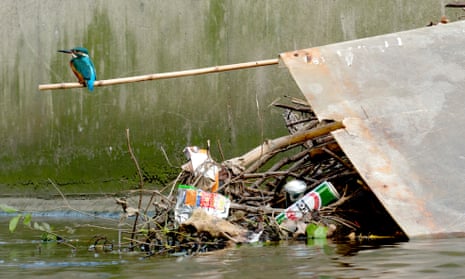Litter louts should be fined a minimum of £500 as part of measures to protect wildlife, according to a thinktank.
Bright Blue recommends 50 new policies in its report, including banning black plastic and non-flushable wipes, ending UK taxpayer subsidies for wood burning in power stations and outlawing the destructive practice of bottom trawling at sea.
Among the positive measures are calls for every secondary school to plant trees, more funding for farmers to support bees and other pollinators, and a £1bn-a-year fund to tackle the global wildlife crisis.
Populations of the UK’s most important wildlife have fallen by an average of 60% since 1970, and the UK is considered to be among the most nature-depleted countries in the world.
The losses mirror the global annihilation of wildlife, which scientists suggest is the start of a sixth mass extinction on Earth and is undermining the natural life-support systems that humanity relies on for air, water and food.
Crucial UN summits on biodiversity and the climate crisis take place in 2020, with the UK hosting the latter in Glasgow in November.
“Biodiversity decline and climate change are urgent and interlinked crises,” said Patrick Hall, a researcher at Bright Blue, a liberal conservative thinktank. “The UK is a world leader in climate change mitigation, being the first major economy to adopt a net-zero emissions target. But there is a need and an opportunity to do the same for biodiversity – to become a global green giant on conservation. Plastic waste is a major threat to our natural environment. It is being ingested by animals, poisoning our soils, killing marine life.”
The report calls for littering fines – currently £50-£80 in England and up to £150 in Wales – to be increased to at least £500. It notes that in Calgary, Canada, fines range from £290-£590, while in Singapore the fine for a first offence is £1,140.
Black plastic should be banned, the report says, because infrared detectors used at recycling plants cannot detect it. Bright Blue also wants thick plastic “bags for life” to cost a minimum of 70p, because many people use them as disposable options. A similar charge in Ireland cut their use by 90%.
Wet wipes flushed down toilets are one of the biggest causes of river pollution and make up 90% of sewer-blocking fatbergs. Fragments are also eaten by aquatic life, causing starvation and death, the report says. It calls for a complete ban on non-flushable wet wipes.
The government has pledged to plant 30m trees a year by 2025. Bright Blue says all 3,448 state secondary schools in the UK should be funded to support this by planting their own trees, engaging students in conservation. An eco-corridor ought to run through every city in the UK, the report says, linking up natural habitats and enabling wildlife to move when wild places are destroyed or the climate crisis hits.
Lack of summer water threatens the health of many rivers as the climate emergency worsens, especially in the south-east, and the report says reducing water demand is paramount. It calls for compulsory minimum efficiency standards for taps, toilets, washing machines and dishwashers.
At sea, there is no ban on bottom trawling in UK marine protected areas, the report says, despite the weighted nets disturbing or destroying everything in their paths. The UK should follow countries such as New Zealand and Indonesia in outlawing the practice, Bright Blue says.
To tackle the global wildlife crisis, the report says the UK should set up a conservation fund of at least £1bn a year using part of the £14bn overseas development aid budget. Bright Blue says: “Historically, there has been a pitiful amount of UK ODA spent on global nature conservation,” although recent pledges of £320m to preserve the world’s endangered species and protect mangroves and forests are “a good start”.
The UK government has signed a treaty that requires the elimination of subsidies that are harmful to global biodiversity. “In contradiction of this, the UK provides subsidies for wood pellets sourced in the US, which contribute to the destruction of ecologically valuable forest ecosystems,” the report says. “We recommend the government phases out all subsidies for the production of biomass.”
Environment minister Lord Zac Goldsmith said: “This is a timely and important contribution to the debate on conservation and climate change. As we embark on what has been described as a ‘super year for nature’, we have a huge opportunity to ramp up global efforts to combat environmental destruction and climate change, which are two sides of the same coin.”
